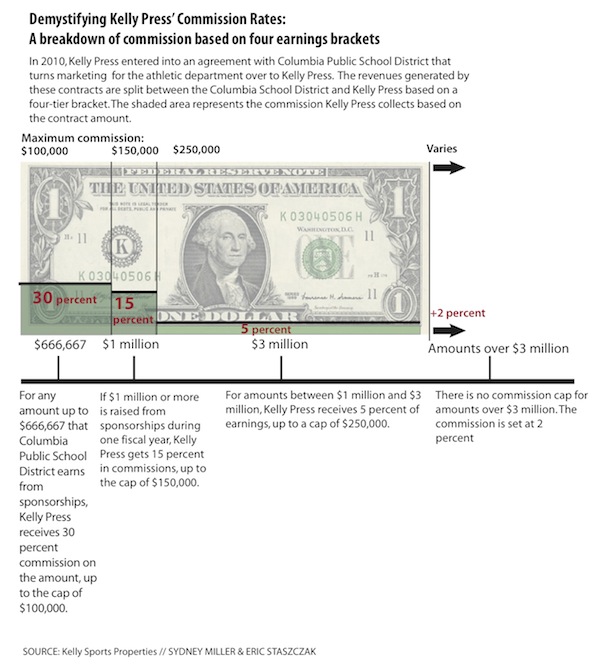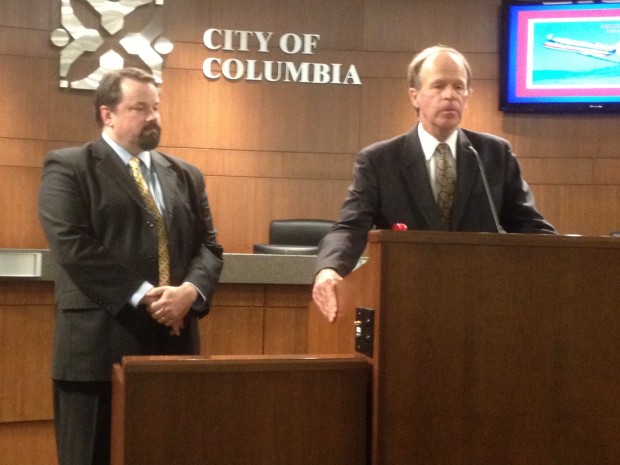Social Media
Journalist, Interrupted
"THE HAZY THOUGHTS OF A FUTURE JOURNALIST"
"THE HAZY THOUGHTS OF A FUTURE JOURNALIST"
Contact
EMAIL
During August-December of 2011, as part of a Convergence Reporting class, I worked in three professional newsrooms affiliated with the MU School of Journalism. On alternate weeks I would work at one of these newsrooms- pitching, researching, writing, producing, shooting and voicing stories- and then the following week I would complete a full feature package story with a partner to pitch at KOMU, KBIA-FM, or The Columbia Missourian.
Below are story packages I created for The Missourian's multimedia project, "The Quad," as well as a business and education story I co-wrote with Eric Staszczak about Columbia Public School's contract with Kelly Press Marketing, a sports marketing agency.
Below are story packages I created for The Missourian's multimedia project, "The Quad," as well as a business and education story I co-wrote with Eric Staszczak about Columbia Public School's contract with Kelly Press Marketing, a sports marketing agency.

"Hickman, Rock Bridge pioneer athletics marketing in Missouri high schools"
Published Jan. 3, 2012
View at ColumbiaMissourian.com
Published Jan. 3, 2012
View at ColumbiaMissourian.com
BY Sydney Miller and Eric Staszczak
COLUMBIA — Hickman and Rock Bridge high schools upgraded to brand new scoreboards in October, the first step in a new partnership between Columbia Public Schools and Columbia-based marketing company Kelly Sports Properties.
A division of the company, Kelly Press, has been providing professional marketing guidance to the high schools since March to raise additional funds for athletics programs. The scoreboards cost about $200,000 each, comparable to those seen on college fields. Standard high school scoreboards, which are usually limited to timekeeping and scoring, usually run between $5,000 and $10,000.
In 2010, Kelly Press entered into an agreement with Columbia Public Schools that turns marketing for the athletic department over to Kelly Press. The revenues generated by these contracts are split between Columbia Public Schools and Kelly Press based on a four-tier bracket.
Despite the higher-than-average cost of the scoreboards, the district hopes increased advertising revenue will help make up for the cost.
Battle High School will see one just like it once the school opens in the fall of 2013. Douglass High School, however, did not receive one of the scoreboards because its sole athletics team is men’s basketball.
Bruce Whitesides, director of athletics for the district, said the primary goal of the partnership is to organize marketing and increase revenue. Under the district's previous approach, individual booster clubs for each sport vied for donations and advertising from local businesses and benefactors.
“We decided to consolidate all our teams, all our schools, and make it one bundled group of entities for schools and sports,” Whitesides said. “Businesses around Columbia would be approached by one person, and revenue would come in one lump sum that would be shared among all (teams).”
The partnership with a private marketing company is something rare in high school athletics. The Columbia Public School District is one of the only districts in Missouri to come to such an agreement, and only one of a few in the country, though other schools have expressed interest, Whitesides said.
“It’s a sign of the times, to be quite honest. With budget deficiencies and cuts, we had to think outside the box,” Whitesides said.
Thinking outside the box for Kelly Press meant cultivating contracts with Landmark Bank, Subway, Columbia Orthopedic, Hy-Vee, Break Time, Boone Hospital Center, State Farm, Fletcher Motors and Columbia College. An average contract can cost up to $125,000 per company, and each contract will be for five years.
In return, companies receive advertising space at the schools’ facilities, schedules, programs and on the websites for Hickman and Rock Bridge athletics.
Some sponsors have other conditions in their contracts. The district's contract with Coca-Cola, for instance, compels the school to serve Coke products at sporting events and in vending machines. With Subway’s contract, coaches can order sandwiches in bulk while on the road for away games. Adidas and Nill Bros. Sports signed a contract with the district in April to provide uniforms and other equipment to teams needing new supplies.
Under the new partnership, half of all funds raised through Kelly Press contracts will be allocated to the highest revenue-generating sports. Football, for example, receives almost 7 percent of the overall budget, while cross country receives 1 percent.
COLUMBIA — Hickman and Rock Bridge high schools upgraded to brand new scoreboards in October, the first step in a new partnership between Columbia Public Schools and Columbia-based marketing company Kelly Sports Properties.
A division of the company, Kelly Press, has been providing professional marketing guidance to the high schools since March to raise additional funds for athletics programs. The scoreboards cost about $200,000 each, comparable to those seen on college fields. Standard high school scoreboards, which are usually limited to timekeeping and scoring, usually run between $5,000 and $10,000.
In 2010, Kelly Press entered into an agreement with Columbia Public Schools that turns marketing for the athletic department over to Kelly Press. The revenues generated by these contracts are split between Columbia Public Schools and Kelly Press based on a four-tier bracket.
Despite the higher-than-average cost of the scoreboards, the district hopes increased advertising revenue will help make up for the cost.
Battle High School will see one just like it once the school opens in the fall of 2013. Douglass High School, however, did not receive one of the scoreboards because its sole athletics team is men’s basketball.
Bruce Whitesides, director of athletics for the district, said the primary goal of the partnership is to organize marketing and increase revenue. Under the district's previous approach, individual booster clubs for each sport vied for donations and advertising from local businesses and benefactors.
“We decided to consolidate all our teams, all our schools, and make it one bundled group of entities for schools and sports,” Whitesides said. “Businesses around Columbia would be approached by one person, and revenue would come in one lump sum that would be shared among all (teams).”
The partnership with a private marketing company is something rare in high school athletics. The Columbia Public School District is one of the only districts in Missouri to come to such an agreement, and only one of a few in the country, though other schools have expressed interest, Whitesides said.
“It’s a sign of the times, to be quite honest. With budget deficiencies and cuts, we had to think outside the box,” Whitesides said.
Thinking outside the box for Kelly Press meant cultivating contracts with Landmark Bank, Subway, Columbia Orthopedic, Hy-Vee, Break Time, Boone Hospital Center, State Farm, Fletcher Motors and Columbia College. An average contract can cost up to $125,000 per company, and each contract will be for five years.
In return, companies receive advertising space at the schools’ facilities, schedules, programs and on the websites for Hickman and Rock Bridge athletics.
Some sponsors have other conditions in their contracts. The district's contract with Coca-Cola, for instance, compels the school to serve Coke products at sporting events and in vending machines. With Subway’s contract, coaches can order sandwiches in bulk while on the road for away games. Adidas and Nill Bros. Sports signed a contract with the district in April to provide uniforms and other equipment to teams needing new supplies.
Under the new partnership, half of all funds raised through Kelly Press contracts will be allocated to the highest revenue-generating sports. Football, for example, receives almost 7 percent of the overall budget, while cross country receives 1 percent.

“Let’s say there are two dollars given. The first dollar is split among all the designated entities (19 sports). The second dollar is dispersed, percentage-wise, the way we’re already budgeted,” Whitesides explained.
According to Kelly Press Vice President Colin See, this helps level the inequalities among revenue-generating sports, such as football, and those that struggle to raise extra funds, such as softball or swimming.
“It takes a bigger hold by taking some of the marketing out of the hands of the parents and booster clubs,” See said.
Kelly Press earns a commission based on a graduated scale. The more money the company brings in through sponsorships, the more it makes.
For Paula Cunningham, Rock Bridge parent and co-president of the Rock Bridge Athletic Booster Club, the partnership with Kelly Press and additional business relationships formed within the past year have been financially beneficial to the schools.
“There are some folks that think (the scoreboards) are too busy, too big or unnecessary," Cunningham said. "Some people are wondering, ‘Are we really at the point where we have to sell everything?’ In my opinion, I think it is a good source of fundraising — it is the future.”
Cunningham has two daughters, Lindsey, a senior, and Sophie, a freshman, who play basketball and volleyball at Rock Bridge. The Athletic Booster Club interested Cunningham because she wanted to stay as involved as possible in her daughters’ school.
It is for this reason, though, that other parents are hesitant to join in supporting the marketing model the district has adopted.
These parents have an ally in Ines Segert, a former member of the School Board. Segert was one of two members on the board to vote against an alliance with Kelly Press in June 2010.
“With the parents and boosters, they felt like they were part of (fundraising), that they had a stake in it,” Segert said. “That’s important psychologically, and if you lose that, you lose some motivation and interest.
“If you start privatizing everything, parents may feel disenfranchised from the school.”
Segert also rejects the notion that the partnership makes fundraising easier for booster clubs.
“Teams would still have to compete with each other for that money,” Segert said. “(Kelly Press) was concerned that if every team went to businesses and asked for money, that people would get tired of getting hit up for money. You go to Kelly Press, but you still have to argue for a bigger share, which would mean other teams getting less.”
Whitesides said despite hesitation from some parents, the overall reception to the new fundraising model has been positive.
“Because the money hasn’t trickled its way down, there’s a little skepticism in the fact that (parents) are not sure how it’s working for them,” See said. “I think in the long term it’ll be a good thing. In the short term, I think there’s some getting used to.”
A lot of the concern, See and Whitesides said, lies in the wait for revenue. They said they believe a few years into the contract, teams will begin seeing the direct flow of dollars into their programs — then, they said, parents will support the privatization process. Until then, they said patience is key.
“Schools have been selling advertising for a long time. We just sell more of it," See said. "We’re doing a better job of it. Is it the right thing? I don’t know, but I’m confident our motives are right and the direction we’re taking is right.”
According to Kelly Press Vice President Colin See, this helps level the inequalities among revenue-generating sports, such as football, and those that struggle to raise extra funds, such as softball or swimming.
“It takes a bigger hold by taking some of the marketing out of the hands of the parents and booster clubs,” See said.
Kelly Press earns a commission based on a graduated scale. The more money the company brings in through sponsorships, the more it makes.
For Paula Cunningham, Rock Bridge parent and co-president of the Rock Bridge Athletic Booster Club, the partnership with Kelly Press and additional business relationships formed within the past year have been financially beneficial to the schools.
“There are some folks that think (the scoreboards) are too busy, too big or unnecessary," Cunningham said. "Some people are wondering, ‘Are we really at the point where we have to sell everything?’ In my opinion, I think it is a good source of fundraising — it is the future.”
Cunningham has two daughters, Lindsey, a senior, and Sophie, a freshman, who play basketball and volleyball at Rock Bridge. The Athletic Booster Club interested Cunningham because she wanted to stay as involved as possible in her daughters’ school.
It is for this reason, though, that other parents are hesitant to join in supporting the marketing model the district has adopted.
These parents have an ally in Ines Segert, a former member of the School Board. Segert was one of two members on the board to vote against an alliance with Kelly Press in June 2010.
“With the parents and boosters, they felt like they were part of (fundraising), that they had a stake in it,” Segert said. “That’s important psychologically, and if you lose that, you lose some motivation and interest.
“If you start privatizing everything, parents may feel disenfranchised from the school.”
Segert also rejects the notion that the partnership makes fundraising easier for booster clubs.
“Teams would still have to compete with each other for that money,” Segert said. “(Kelly Press) was concerned that if every team went to businesses and asked for money, that people would get tired of getting hit up for money. You go to Kelly Press, but you still have to argue for a bigger share, which would mean other teams getting less.”
Whitesides said despite hesitation from some parents, the overall reception to the new fundraising model has been positive.
“Because the money hasn’t trickled its way down, there’s a little skepticism in the fact that (parents) are not sure how it’s working for them,” See said. “I think in the long term it’ll be a good thing. In the short term, I think there’s some getting used to.”
A lot of the concern, See and Whitesides said, lies in the wait for revenue. They said they believe a few years into the contract, teams will begin seeing the direct flow of dollars into their programs — then, they said, parents will support the privatization process. Until then, they said patience is key.
“Schools have been selling advertising for a long time. We just sell more of it," See said. "We’re doing a better job of it. Is it the right thing? I don’t know, but I’m confident our motives are right and the direction we’re taking is right.”
Mark Kuchak has always rooted for Mizzou. As a fan, he naturally had an opinion on the University’s decision to move from the Big 12 conference to the Southeastern Conference.
“It’s kind of bittersweet,” Kuchak said. “They don’t understand how huge that is. They’ve had a rivalry for what, 129 years? And all of a sudden they aren’t playing each other?”
Kuchak’s concern over the move is larger than being a lifelong fan. He’s been the manager of Big 12 Bar & Grill for two years. Last year’s University athletic events brought in an estimated $147 million – both direct and indirect revenue – to Columbia, according to a study sponsored by the Columbia Chamber of Commerce. The authors project that the economic impact will increase to $185 million this year, the University’s first year in the Southeastern Conference. Kuchak wonders how the move will change the dynamics of MU sports and business. Read more.
“It’s kind of bittersweet,” Kuchak said. “They don’t understand how huge that is. They’ve had a rivalry for what, 129 years? And all of a sudden they aren’t playing each other?”
Kuchak’s concern over the move is larger than being a lifelong fan. He’s been the manager of Big 12 Bar & Grill for two years. Last year’s University athletic events brought in an estimated $147 million – both direct and indirect revenue – to Columbia, according to a study sponsored by the Columbia Chamber of Commerce. The authors project that the economic impact will increase to $185 million this year, the University’s first year in the Southeastern Conference. Kuchak wonders how the move will change the dynamics of MU sports and business. Read more.
"Restaurants Prepare for SEC Traveling
Teams, Huge Crowds"
Published September 7, 2012
Teams, Huge Crowds"
Published September 7, 2012

What housing bubble? As far as the city of Columbia is concerned, the building market for apartment complexes is no longer a sinking ship, and new student housing can take much of the credit for keeping the industry afloat.
According to City of Columbia Department of Public Works data, the number of building permits for “New Multi Family 5 or More Units” increased from two to 24.
Phillip Teeple, the Building Regulations Supervisor for Columbia’s Department of Community Development, attributes this increase to the influx of new student apartment complexes. He adds, though, that this number includes apartments that are not student housing, and even includes sororities and fraternities.
The Department of Public Works documents the valuation for these permits as increasing by $36.8 million from 2010 to 2011, while other years had an increased valuation of a couple million dollars at most, and even losses. Read more.
According to City of Columbia Department of Public Works data, the number of building permits for “New Multi Family 5 or More Units” increased from two to 24.
Phillip Teeple, the Building Regulations Supervisor for Columbia’s Department of Community Development, attributes this increase to the influx of new student apartment complexes. He adds, though, that this number includes apartments that are not student housing, and even includes sororities and fraternities.
The Department of Public Works documents the valuation for these permits as increasing by $36.8 million from 2010 to 2011, while other years had an increased valuation of a couple million dollars at most, and even losses. Read more.

"Columbia Student Housing Increase in Scale, Profits, Move Downtown"
Published September 11, 2012
Published September 11, 2012
The University of Missouri’s move to the Southeastern Conference (SEC) has been drawing record-number crowds to Columbia- and many of these SEC fans are flying.
For the already sold-out SEC game against Alabama, Columbia Regional Airport Manager Don Elliott says Delta has added a direct flight to Birmingham, Ala., which would be the second time the airline has added a flight to serve the needs of SEC fans.
The first weekend that required added flights, Elliot said, was during Mizzou’s debute in the SEC against Georgia. Elliot said two of the “Georgia” flights were at full capacity, with two other flights being at 98 and 96 percent capacity.
“I’ve been here 30 years, and this was the first time I have noticed such a major turnout,” Elliott said.
This growth has led Columbia Mayor Bob McDavid to push for expanded air service in the area. McDavid recently announced he had secured $3 million in pledges to lure another airline to the Airport. Read more.
For the already sold-out SEC game against Alabama, Columbia Regional Airport Manager Don Elliott says Delta has added a direct flight to Birmingham, Ala., which would be the second time the airline has added a flight to serve the needs of SEC fans.
The first weekend that required added flights, Elliot said, was during Mizzou’s debute in the SEC against Georgia. Elliot said two of the “Georgia” flights were at full capacity, with two other flights being at 98 and 96 percent capacity.
“I’ve been here 30 years, and this was the first time I have noticed such a major turnout,” Elliott said.
This growth has led Columbia Mayor Bob McDavid to push for expanded air service in the area. McDavid recently announced he had secured $3 million in pledges to lure another airline to the Airport. Read more.
"Columbia Regional Airport Adds Flights for SEC, Aims to Lure New Airline"
Published October 8, 2012
Published October 8, 2012

"Columbia Announces Tentative Deal with American Airlines"
Published October 12, 2012
Published October 12, 2012
After months of courting airlines, Columbia Mayor Bob McDavid announced a tentative partnership between the city and American Airlines last night.
Pending City Council approval, American Airlines will start offering twice daily flights to Dallas and daily flights to Chicago mid-February. Previously, the limited flights kept many businesses from rooting in Columbia.
“We lost 220 jobs to a European company that picked Ames, Iowa because they were within an hour of one stop to Barcelona,” McDavid said. “A man from Columbia, who has a technology firm in Silicon Valley, wants to hire engineers from Missouri, he wants to have a presence here, but he’s got to have one stop connection.”
The pursuit of a new airline was supported by businesses from Columbia to Jefferson City, and McDavid emphasizes the potential business victories Columbia has already won just by attracting a major airline. Read more.
Pending City Council approval, American Airlines will start offering twice daily flights to Dallas and daily flights to Chicago mid-February. Previously, the limited flights kept many businesses from rooting in Columbia.
“We lost 220 jobs to a European company that picked Ames, Iowa because they were within an hour of one stop to Barcelona,” McDavid said. “A man from Columbia, who has a technology firm in Silicon Valley, wants to hire engineers from Missouri, he wants to have a presence here, but he’s got to have one stop connection.”
The pursuit of a new airline was supported by businesses from Columbia to Jefferson City, and McDavid emphasizes the potential business victories Columbia has already won just by attracting a major airline. Read more.

"Boomer Entrepeneurs on the 'FastTrac'
for Business Sucess"
Published November 8, 2012
for Business Sucess"
Published November 8, 2012
Dan Stratman had an idea. As a captain, he knew the airline industry. He decided to launch a mobile app, “Airport Life,” that aims to make the lives of travelers easy and hassle-free.
He’s also 53 years old.
Stratman represents a burgeoning group of baby boomers entering entrepreneurship, breaking stereotypes of 20-something trailblazers. The Kansas City-based Kauffman Foundation launched a “NewVenture for the Boomer Entrepreneur” course designed for baby boomers based on a recent study, “The Entrepreneurial Boom,” that showed “Americans between the ages of 55 and 64 had a higher rate of entrepreneurial activity than those aged 20-34, averaging a rate of entrepreneurial activity roughly one-third larger than their youngest counterparts.”
In fact, the study found the 20-34 age bracket to have the lowest rates of entrepreneurial activity. Read more.
He’s also 53 years old.
Stratman represents a burgeoning group of baby boomers entering entrepreneurship, breaking stereotypes of 20-something trailblazers. The Kansas City-based Kauffman Foundation launched a “NewVenture for the Boomer Entrepreneur” course designed for baby boomers based on a recent study, “The Entrepreneurial Boom,” that showed “Americans between the ages of 55 and 64 had a higher rate of entrepreneurial activity than those aged 20-34, averaging a rate of entrepreneurial activity roughly one-third larger than their youngest counterparts.”
In fact, the study found the 20-34 age bracket to have the lowest rates of entrepreneurial activity. Read more.
A few days before the Columbia City Council’s approval of the American Airlines deal with Columbia Regional Airport to expand daily flights to Chicago and Dallas, the airport’s main breadwinner—Delta—wrote to Columbia Bob McDavid, threatening to discontinue service in mid-Missouri if the deal took place.
It has now been announced Delta plans to leave Columbia Regional Airport on Feb. 13, a day before American Airlines will begin flights.
Delta’s bone of contention was with the incentive package the city used to lure American Airlines. The package included waived landing and rental fees, up to $400 thousand in exclusive radio advertising and a $3.3 million revenue guarantee fund, in case American does not break even with ticket sales. Read more.
It has now been announced Delta plans to leave Columbia Regional Airport on Feb. 13, a day before American Airlines will begin flights.
Delta’s bone of contention was with the incentive package the city used to lure American Airlines. The package included waived landing and rental fees, up to $400 thousand in exclusive radio advertising and a $3.3 million revenue guarantee fund, in case American does not break even with ticket sales. Read more.
"Delta to Leave Columbia Regional Airport Over American Airlines Deal"
Published November 8, 2012
Published November 8, 2012

During August-December of 2012, as part of a Convergence Editing class, I worked at Missouri Business Alert, a start-up based on the University's campus. Below are clips from my time at Missouri Business Alert.
Also during this semester, I was a blogger for the Society of American Business Editors and Writers' "College Connect" blog. You can read my first blog here.
As this semester is ongoing, this page will be updated with more clips.
Also during this semester, I was a blogger for the Society of American Business Editors and Writers' "College Connect" blog. You can read my first blog here.
As this semester is ongoing, this page will be updated with more clips.

